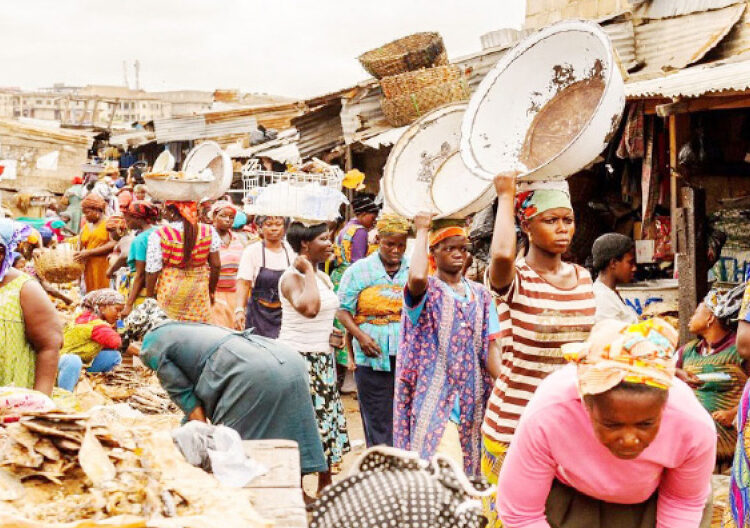With galloping inflation that officially stands at 33.2 per cent, it has become trite to suggest that Nigerians have had to endure a lot recently. The hard times span the whole gamut of the economy such as food inflation, high cost of other household items, unemployment and high cost of energy. Security challenges are not left out in this dire situation that is testing the resilience and strength of the people and their capability to endure adversity.
Recently, the government is beating its chest that it has been able to rein in the dollar vis-à-vis the value of the Naira. Before now, the refrain everywhere is the ridiculous idea that the value of the dollar determines the price of staple food items like yam and garri. That Naira is winning the war against the dollar and yet prices keep going up, defeats the argument that the dollar is the culprit in the inflationary spiral the nation is experiencing.
This became obvious as the increasing cost of food in Nigeria is significantly affecting the living standards of ordinary citizens. In our opinion, food inflation in the country reflects low productivity in the agricultural sector. Output has failed to keep up with population growth. Nigeria’s population has been growing by about 2.4 per cent a year, while the growth of agricultural value added is a paltry 1.8 per cent.
Experts attribute this precarious situation to insecurity issues which have resulted significant reduction in food production and a concomitant rise in food prices. Cost of basic food items such as rice, beans, yams, vegetables, and poultry products, among others, have been increasing astronomically with millions of the citizens struggling to adjust.
As if this is not bad enough, food inflation in the country surged to 40.01 percent annually, which is 15 points higher compared to the rate recorded in the corresponding month last year. The National Bureau of Statistics (NBS) disclosed this in its latest consumer price index and inflation report. The figure showed that the country’s inflation surged by 3.62 percent compared to the 37.92 percent recorded in February.
According to NBS, the year-on-year increase in food inflation was propelled by a rise in the prices of items such as garri, millet, akpu uncooked fermented (which are under the bread and cereals class), yam tuber, water yam (under potatoes, yam, and other tubers class), dried fish sadine, mudfish dried (under fish class), palm oil, vegetable oil (under oil and fat), beef feet, beef head, liver (under meat class), coconut, water melon (under fruit class), lipton tea, bournvita, milo (under coffee, tea and cocoa class).
As noted earlier and despite the recent appreciation of the naira against the dollar, the prices of food items have remained stubbornly high. This has left many Nigerians struggling to make ends meet as they are forced to pay exorbitant prices for basic food items.
We consider it pertinent to emphasize that what is frustrating about this situation is that the security situation is a rogue factor. For this reason, the cost of production for many of these food items has increased significantly. In many cases, the supply chain has suffered disruptions that would justify such high prices.
To this extent, therefore, it is our considered opinion that the government needs to take decisive action to bring down the cost of food and ease the burden on ordinary Nigerians. One potential solution is to increase investment in agriculture and other food production sectors to boost supply and bring down prices. The other is to rein in, decisively, the monster called insecurity
In addition, there needs to be greater transparency and accountability in the food supply chain. This means cracking down on hoarders and profiteers who are taking advantage of the situation to exploit the sufferings of the Nigerian people for pecuniary gains.
Ultimately, it stands to reason that the high prices of food items are not just an economic issue, they are a humanitarian issue. It’s time for all stakeholders, from the government to the private sector to civil society organisations, to come together and find solutions that will ensure that Nigerians have access to affordable, nutritious food. The people of this nation deserve nothing less.
From recent experiences, no single factor can adequately explain rising inflation and escalating food costs in Nigeria. The country’s unprecedented inflation is a case of multiple factors interacting to trigger cost-push inflation. There seems to be no respite for Nigerians on food prices despite the rise in naira value.
As a newspaper, we urge the government to critically review the economic burden the people are made to bear with the intention of bringing it within manageable limits. For instance, the new electricity tariff has added an extra burden on the people. Rising energy costs impact households in various ways, including economic, social, emotional, and material aspects. On the basis of this, it is appropriate that the government let its policies wear a human face.





